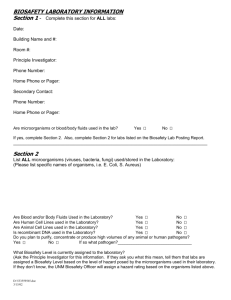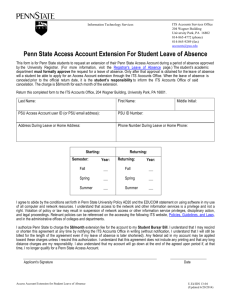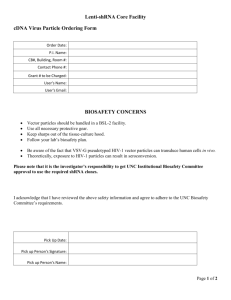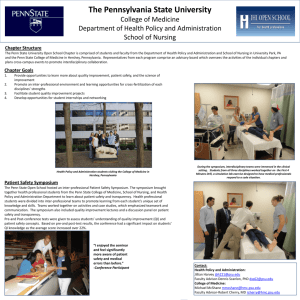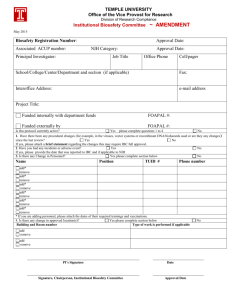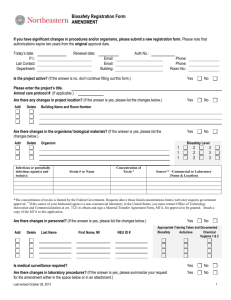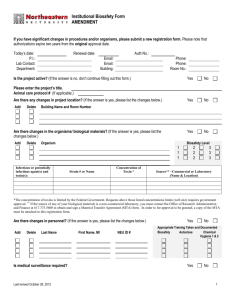2014 LabManager Poster - PennState
advertisement
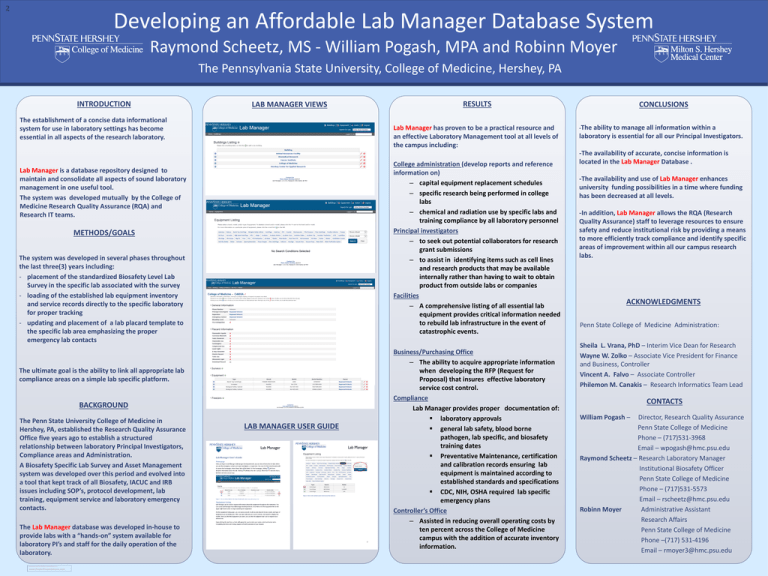
2 Developing an Affordable Lab Manager Database System Raymond Scheetz, MS - William Pogash, MPA and Robinn Moyer The Pennsylvania State University, College of Medicine, Hershey, PA INTRODUCTION LAB MANAGER VIEWS The establishment of a concise data informational system for use in laboratory settings has become essential in all aspects of the research laboratory. Lab Manager has proven to be a practical resource and an effective Laboratory Management tool at all levels of the campus including: College administration (develop reports and reference information on) – capital equipment replacement schedules – specific research being performed in college labs – chemical and radiation use by specific labs and training compliance by all laboratory personnel Principal investigators – to seek out potential collaborators for research grant submissions – to assist in identifying items such as cell lines and research products that may be available internally rather than having to wait to obtain product from outside labs or companies Facilities – A comprehensive listing of all essential lab equipment provides critical information needed to rebuild lab infrastructure in the event of catastrophic events. Lab Manager is a database repository designed to maintain and consolidate all aspects of sound laboratory management in one useful tool. The system was developed mutually by the College of Medicine Research Quality Assurance (RQA) and Research IT teams. METHODS/GOALS The system was developed in several phases throughout the last three(3) years including: - placement of the standardized Biosafety Level Lab Survey in the specific lab associated with the survey - loading of the established lab equipment inventory and service records directly to the specific laboratory for proper tracking - updating and placement of a lab placard template to the specific lab area emphasizing the proper emergency lab contacts The ultimate goal is the ability to link all appropriate lab compliance areas on a simple lab specific platform. BACKGROUND The Penn State University College of Medicine in Hershey, PA, established the Research Quality Assurance Office five years ago to establish a structured relationship between laboratory Principal Investigators, Compliance areas and Administration. A Biosafety Specific Lab Survey and Asset Management system was developed over this period and evolved into a tool that kept track of all Biosafety, IACUC and IRB issues including SOP’s, protocol development, lab training, equipment service and laboratory emergency contacts. The Lab Manager database was developed in-house to provide labs with a “hands-on” system available for laboratory PI’s and staff for the daily operation of the laboratory. RESEARCH POSTER PRESENTATION DESIGN © 2012 www.PosterPresentations.com RESULTS LAB MANAGER USER GUIDE Business/Purchasing Office – The ability to acquire appropriate information when developing the RFP (Request for Proposal) that insures effective laboratory service cost control. Compliance Lab Manager provides proper documentation of: laboratory approvals general lab safety, blood borne pathogen, lab specific, and biosafety training dates Preventative Maintenance, certification and calibration records ensuring lab equipment is maintained according to established standards and specifications CDC, NIH, OSHA required lab specific emergency plans Controller’s Office – Assisted in reducing overall operating costs by ten percent across the College of Medicine campus with the addition of accurate inventory information. CONCLUSIONS -The ability to manage all information within a laboratory is essential for all our Principal Investigators. -The availability of accurate, concise information is located in the Lab Manager Database . -The availability and use of Lab Manager enhances university funding possibilities in a time where funding has been decreased at all levels. -In addition, Lab Manager allows the RQA (Research Quality Assurance) staff to leverage resources to ensure safety and reduce institutional risk by providing a means to more efficiently track compliance and identify specific areas of improvement within all our campus research labs. ACKNOWLEDGMENTS Penn State College of Medicine Administration: Sheila L. Vrana, PhD – Interim Vice Dean for Research Wayne W. Zolko – Associate Vice President for Finance and Business, Controller Vincent A. Falvo – Associate Controller Philemon M. Canakis – Research Informatics Team Lead CONTACTS William Pogash – Director, Research Quality Assurance Penn State College of Medicine Phone – (717)531-3968 Email – wpogash@hmc.psu.edu Raymond Scheetz – Research Laboratory Manager Institutional Biosafety Officer Penn State College of Medicine Phone – (717)531-5573 Email – rscheetz@hmc.psu.edu Robinn Moyer Administrative Assistant Research Affairs Penn State College of Medicine Phone –(717) 531-4196 Email – rmoyer3@hmc.psu.edu
